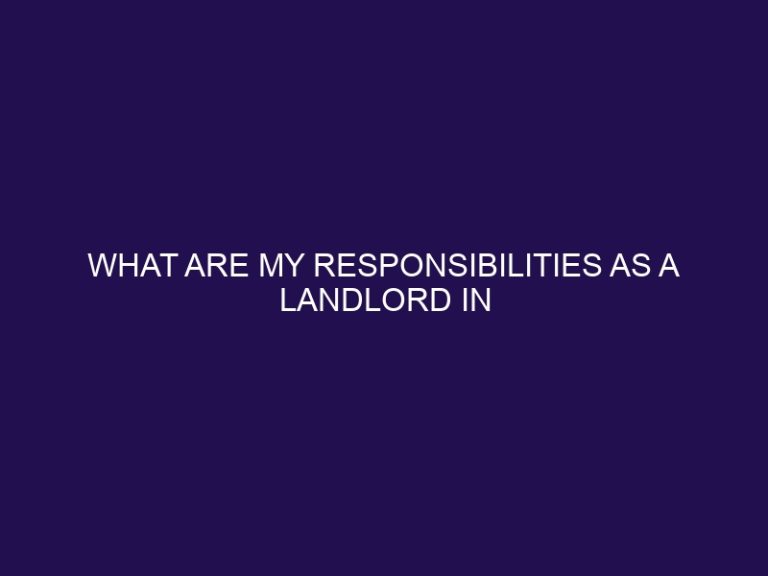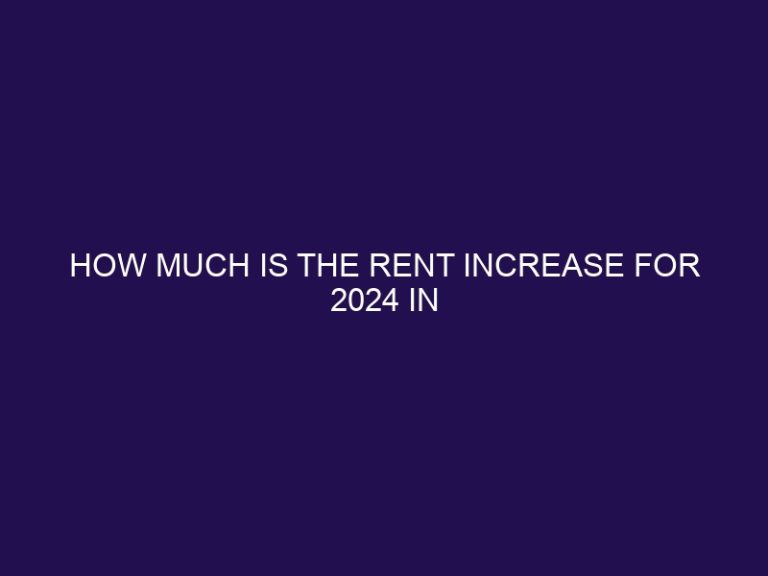What is the process to increase rent in British Columbia?
.jpg)
Increasing rent is a common process in the rental market, and landlords in British Columbia must follow specific guidelines and legal requirements when implementing rent increases. Understanding the process is essential to ensure compliance and maintain a fair and transparent relationship with tenants. Here is a step-by-step overview of the process to increase rent in British Columbia:
Step 1: Check the Applicable Rent Increase Guidelines
Landlords must familiarize themselves with the current rent increase guidelines set by the Residential Tenancy Branch. These guidelines specify the maximum allowable rent increase percentage for a given year.
Step 2: Provide Proper Notice to Tenants
Landlords must provide written notice of the rent increase to tenants at least three full months before the effective date. The notice must include the new rent amount, the date of the rent increase, and a statement referring to the rent increase guideline.
Step 3: Calculate the Allowable Rent Increase Percentage
Using the current guidelines, landlords can determine the maximum percentage by which they can increase the rent. This calculation is based on factors such as the rental unit’s location, age, and any applicable exemptions or exceptions.
Step 4: Complete the Notice of Rent Increase Form
Landlords must complete the official Notice of Rent Increase form provided by the Residential Tenancy Branch. This form documents all the necessary information related to the rent increase and serves as an official notice to the tenant.
Understanding the legal requirements for rent increase is crucial for landlords in British Columbia. It is essential to be aware of any limitations on the amount of rent increase and any exceptions or exemptions that may apply. In the event that a tenant objects to the rent increase, there are steps that can be taken to address the concern and to ensure all parties are treated fairly. If disputes arise, there is a process for tenants to file a dispute resolution request and challenge the rent increase on specific grounds. By following the proper procedures and adhering to the legal requirements, both landlords and tenants can navigate the rent increase process in British Columbia with clarity and transparency.
Key takeaways:
- Check the applicable rent increase guidelines: Before increasing rent, landlords in British Columbia need to review the current guidelines provided by the Residential Tenancy Branch.
- Provide proper notice to tenants: Landlords must give tenants proper notice in writing before increasing rent. The notice must include specific information regarding the increase.
- Calculate the allowable rent increase percentage: Landlords can only increase rent by a designated percentage each year. The percentage is determined by the Residential Tenancy Branch and may vary annually.
What Is the Process to Increase Rent in British Columbia?
Curious about how to increase rent in British Columbia? Dive into the step-by-step process that landlords must follow to raise rent. Explore important guidelines, the proper notice to tenants, calculating the allowable percentage increase, and completing the necessary forms. Whether you’re a new landlord or looking to navigate the legal requirements, this section has got you covered. Get ready to increase your rental income while staying in compliance with British Columbia’s regulations.
Step 1: Check the Applicable Rent Increase Guidelines
To increase rent in British Columbia, the first necessary step is to diligently check the applicable rent increase guidelines. These guidelines are specifically designed to outline the maximum allowable rent increase percentage set by the government each year. As responsible landlords, it is essential to adhere to these guidelines in order to ensure legal compliance and avoid any potential disputes with tenants. By carefully reviewing these guidelines, landlords can accurately determine the maximum amount by which they are permitted to increase the rent. Staying well-informed and up to date with the current guidelines is crucial, as it guarantees a fair and lawful process for increasing the rent.
Step 2: Provide Proper Notice to Tenants
To increase rent in British Columbia, landlords must follow certain steps to provide proper notice to tenants:
- Review the applicable rent increase guidelines set by the Residential Tenancy Branch.
- Provide proper notice to tenants at least three months before the proposed rent increase.
- The notice must include the effective date of the increase, the new rent amount, and any information regarding the tenant’s rights and responsibilities.
- Calculate the allowable rent increase percentage based on the guidelines.
- Complete the Notice of Rent Increase form provided by the Residential Tenancy Branch.
By following these steps, landlords can ensure they are providing proper notice to tenants when increasing rent in British Columbia.
Step 3: Calculate the Allowable Rent Increase Percentage
To calculate the allowable rent increase percentage in British Columbia, follow these steps:
- Check the annual rent increase guidelines provided by the Residential Tenancy Branch.
- Determine the year in which the previous rent increase took effect.
- Calculate the Allowable Rent Increase Percentage using the appropriate formula.
- Multiply the current rent by the allowable percentage increase to determine the maximum rent increase amount.
- Ensure the new rent amount does not exceed the maximum allowable rent for similar rental units in the vicinity.
In 2019, the allowable rent increase percentage in British Columbia was capped at 2.5%. This measure was implemented to protect tenants from unaffordable housing costs and promote housing stability in the province.
Step 4: Complete the Notice of Rent Increase Form
Completing the Notice of Rent Increase Form in British Columbia involves several steps:
- Obtain a copy of the form from the Residential Tenancy Branch website.
- Fill in the required information, such as the tenant’s name, address, and current rent amount.
- Indicate the new rent amount and date it will take effect.
- Step 4: Complete the Notice of Rent Increase Form
- Include the calculation used to determine the allowable rent increase percentage.
- Sign and date the form.
- Provide a copy of the completed form to the tenant, either in person or by certified mail.
- Keep a copy of the form for your records.
Remember to comply with the legal requirements and timelines specified by the Residential Tenancy Act in British Columbia.
What Are the Legal Requirements for Rent Increase?
When considering a rent increase in British Columbia, landlords must adhere to specific legal requirements. What are the legal requirements for rent increase? These include providing written notice to tenants at least three months in advance, using the correct notice form, and adhering to the maximum allowable rent increase set by the Residential Tenancy Branch. It is essential to familiarize oneself with these legal obligations to ensure compliance and maintain good landlord-tenant relationships. Seeking legal advice or consulting resources such as the Residential Tenancy Branch can provide further guidance on rent increase procedures and regulations.
Is There a Limit on the Amount of Rent Increase?
Is There a Limit on the Amount of Rent Increase?
In British Columbia, there is a strict limit imposed on the amount of rent increase that landlords can impose on their tenants. According to the rental guidelines, the government determines a specific percentage by which landlords can increase the rent each year. The primary purpose of this regulation is to prevent any excessive rent hikes. Annually, the maximum allowable rent increase percentage is announced, and landlords are legally bound to adhere to this limit when raising the rent. By implementing such a rule, tenants are effectively protected from facing unaffordable rent increases, ensuring stability in their housing costs.
Are There Any Exceptions or Exemptions?
Are There Any Exceptions or Exemptions?
In British Columbia, there are certain exceptions and exemptions when it comes to increasing rent. Rent increases may not apply if the rental unit is subsidized through government programs or if it falls under specific categories such as non-profit housing. If the rental unit is less than one year old, the landlord cannot increase the rent. Additionally, if there are multiple rental units in the building, there may be limitations on the amount of rent increase. It’s crucial for landlords to familiarize themselves with the Residential Tenancy Act to understand all the exceptions and exemptions that apply. For expert guidance on compliance with the regulations, it is advisable to consult with a legal professional.
What to Do if a Tenant Objects to the Rent Increase?
When a tenant objects to a rent increase, it’s important to handle the situation correctly. Here are the steps to follow:
- What to Do if a Tenant Objects to the Rent Increase? Review the tenancy agreement to understand the terms and conditions.
- Communicate with the tenant to understand their concerns and reasons for objection.
- Consider negotiating a compromise, such as a smaller rent increase or a longer notice period.
- If no agreement is reached, consult with a legal professional to understand your rights and options.
- Provide proper written notice if you decide to proceed with the rent increase.
Fact: In British Columbia, landlords must follow specific guidelines and provide proper notice before increasing rent to ensure a fair and legal process for both parties involved.
Can Rent Increases Be Challenged or Disputed?
Yes, rent increases in British Columbia can be challenged or disputed under certain circumstances. Tenants have the right to dispute a rent increase if they believe it violates the Residential Tenancy Act. Can Rent Increases Be Challenged or Disputed? Some valid reasons for challenging a rent increase include the landlord not providing proper written notice or the increase being excessive or unfair. Tenants can dispute a rent increase by submitting a dispute resolution application with the Residential Tenancy Branch. It’s important for tenants to gather evidence and documentation to support their case. Seeking legal advice or consulting a tenants’ rights organization can also be helpful in navigating the dispute process.
What Are the Grounds for Challenging a Rent Increase?
What Are the Grounds for Challenging a Rent Increase?
Tenants in British Columbia have the legal right to challenge a rent increase if it fails to meet the required criteria. These grounds to challenge a rent increase include not receiving proper notice, surpassing the allowable rent increase percentage, or imposing the increase on an exempt unit. To dispute the rent increase, tenants can initiate a request for dispute resolution. It is crucial to gather supporting evidence and provide accompanying documentation to bolster the case. By following the correct procedure and comprehending the grounds for challenging a rent increase, tenants can safeguard their rights and ensure equitable treatment.
How Can a Tenant File a Dispute Resolution Request?
How Can a Tenant File a Dispute Resolution Request?
When a tenant wants to file a dispute resolution request in British Columbia, they can follow a specific process. Here are the steps they should take:
- Step 1: Gather all relevant documentation and evidence to support their case.
- Step 2: Complete the Dispute Resolution Request form, providing details of the dispute and the desired outcome.
- Step 3: Submit the form and any supporting documents to the Residential Tenancy Branch.
- Step 4: Pay the required filing fee, which is typically a small amount.
- Step 5: Await notification of the dispute resolution hearing date from the Residential Tenancy Branch.
- Step 6: Attend the hearing and present their case, providing evidence and arguments to support their position.
- Step 7: Wait for the decision from the dispute resolution officer, who will provide a written determination.
- Step 8: Follow any orders or directives given by the dispute resolution officer.
By following these steps, tenants can file a dispute resolution request to seek a resolution to their disagreement with their landlord.
Some Facts About How To Increase Rent in British Columbia:
- ✅ Rent increases can only occur once every 12 months starting from the second year of the tenancy.
- ✅ Rent increases must be equal to the percentage of inflation.
- ✅ Landlords must provide tenants with a Notice of Rent Increase form three months in advance.
- ✅ Non-profit housing and rent based on income are exempt from rent increase rules.
- ✅ Landlords can apply for additional rent increases in exceptional circumstances, which may require permission from the Residential Tenancy Branch (RTB).
Frequently Asked Questions
What is the annual limit for rent increases in British Columbia?
The annual limit for rent increases in British Columbia is determined by the B.C. government and set at 2% for 2023 and 3.5% for 2024, taking into account factors such as high inflation and the consumer price index.
Does the annual rent increase limit apply to all types of rental properties?
The annual rent increase limit set by the B.C. government applies only to residential properties and not to commercial properties such as office spaces, retail spaces, or any property where rent is tied to the tenant’s income, such as subsidized housing.
What is the process for increasing rent in British Columbia?
Landlords in British Columbia can increase rent once a year, but they must provide tenants with a written notice at least three months in advance using the appropriate rent increase form. The new rate must take effect at least 12 months after the previous increase or the start of the lease for new tenants.
Can landlords increase rent beyond the annual limit?
Yes, landlords in British Columbia can increase rent beyond the annual limit by creating a voluntary agreement with the tenants. This agreement must be in writing and include the rent increase in dollars and percentage. Alternatively, landlords can apply to the Residential Tenancy Branch for eligible expenses or capital expenditures, such as operating costs, property maintenance, energy reduction, or property remediation.
What happens if landlords fail to follow the proper notice period for a rent increase?
If landlords fail to provide tenants with the required three months’ notice in writing before increasing rent, tenants have the right to continue paying their current rent until the proper notice period has passed. They can deduct any overpayment resulting from an illegal rent increase from their next rent payment.
Are there any exceptions to the rent increase rules in British Columbia?
Yes, exemptions to the rent increase rules apply to non-profit housing and rent based on income. These rules do not apply to these types of housing arrangements, and different regulations may govern their rent increase processes.







